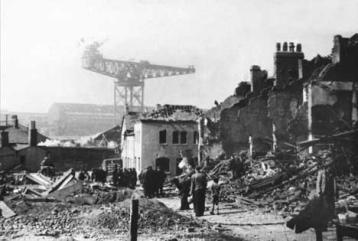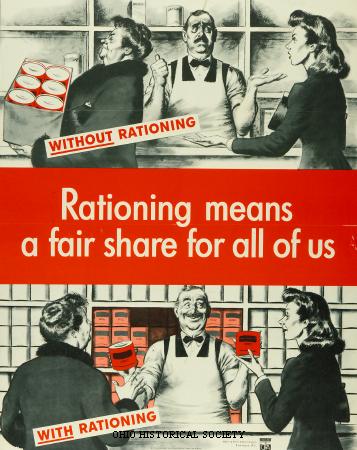Nella wrote her diaries as a contribution to the Mass Observation Project, set up in the 1930s after the abdication of Edward VIII; a time of momentous social and political change. The project's aim was to push aside the official line, record the feelings of the populace and capture the public mood by documenting the everyday lives of a self-selecting panel of untrained volunteers. Participants not only wrote about their own circumstances, they often commented on those of their friends and neighbours as well - as you might imagine, the quality and range of information recorded varies widely.
Nella Last's War (helpfully edited and annotated by Richard Broad and Suzie Fleming) begins at the outbreak of the Second World War in 1939 and so provides a remarkable insight into the often-overlooked day-to-day domestic lives of civilians as events unfold. Nella lives in Barrow-in-Furness, a northern industrial town with a shipyard not far from Liverpool. She has a husband running his own carpentry business and two grown up sons; Arthur, training to be a tax inspector in Manchester and Cliff who is waiting to leave for military service.
One of the first effects of the war is the blackout; all street lights are extinguished, no car headlights permitted and windows curtained with heavy black material. Evacuees are sent from the cities into the surrounding countryside, rationing begins and Nella becomes a very active member of her local W.V.S (Women's Voluntary Service), making up blankets from oddments and supervising supplies. All this before any action has been seen; this is the period of the 'phoney war', when the only significant fighting for Britain was at sea.
This apparent calm doesn't last though, and during the Battle of Britain, Barrow with its shipyard is targeted by German bombers night after night. Nella comes to dread the full moon which lights the bombers' way as the nights are interrupted by air-raid sirens and bombing runs and she numbers her friends and acquaintances among the casualties.
 |
| Barrow in the Blitz |
Even this nightly terror becomes another routine hardship of the war on some occasions - in one 1940 diary entry Nella writes
We were wakened by guns and the noise of planes and we wondered if it was best to get up and dressed, but while I was considering the point I fell fast asleep, so the question solved itself.This is a story of a make do and mend; of how Nella and her generation, who remember all too clearly the fighting of 1914-18 trumpeted as the war to end all wars, endure rationing and shortage, loss and despair.
Yet underneath the hardship is a personal story too; a woman struggling to endure the emotional wasteland that is her marriage, during a time when a wife's duty was to have her husband's meal on the table and his slippers warming by the fireside. Nella is lively and gregarious by nature but her husband prefers to stay in and be quiet at the end of a day's work, which means she must do so too. Before 1939 she seems to have undergone a nervous breakdown and so, in some ways, horrendous as war is, it brings Nella a degree of liberation with the loosening of social norms. She is able to go out, despite the blackout, to the W.V.S and later a mobile canteen and the Red Cross shop, to enjoy the feeling of community and the realisation that her contribution is making some difference to the lives of 'our boys'.
 |
| Nella and Cliff |
The past really is another country, and although today she would most likely ditch the intractable partner for someone more compatible, in her diaries Nella doesn't consider any option other than enduring her marriage. She invests her love instead in the strong mutual relationship with her sons Arthur and Cliff; fretting about their well-being and worrying when their letters don't arrive but drawing comfort from their correspondence and sporadic visits home.
In some ways, I found this book to be an unexpected roller-coaster. Just as I was tucking myself in for another night under the indoor air raid shelter with Nella's blankets and cloth dolls, casseroles and steamed puddings, there would be a diary entry I found truly unsettling. The arrival on Nella's doorstep of a baby in a paper bag was a shock, as was her early support for Hitler's 'painless' gassing of lunatics. Cliff's homosexuality is apparent to the modern reader and yet Nella herself seems oblivious to it. But in other ways her writing is extremely empathetic to soldiers and civilians of both sides enduring the privations of war; the Jews in the gas chambers, mothers losing their sons.
In the end, though, my feeling for Nella is one of overwhelming admiration. Writing pours out of her; Nella's greatest luxury is a new supply of notebooks for her letters and diaries. She documents everyday life candidly and well, often with an acute awareness of the social changes happening about her. She's always longed to travel but instead relies on her writing and war-time activities to bring her some release from the strictures of her life and a marriage of convenience. When the war ends, she feels surprisingly little; it's odd, she notes, to hear the weather forecast on the radio again but, amidst the celebrations, she decides to take two aspirins and read herself to sleep.
I'm looking forward to discussing Nella Last's War in my book club soon. Have you read it yet? What did you think of it?


Hi - just found you. New blogger here writing about books and other stuff and we seem to have chosen the same blogger background. This book sounds wonderful and the ideal birthday present for my sister in law who grew up in wartime and now lives near Barrow. Thanks!
ReplyDeleteHi Eleanor, good to hear from you! Hope your sister-in-law enjoys the book, it should be especially interesting for someone who knows the area well - there's so much local detail.
DeleteIf not for Baba Powers what would my life turn out to be? I want you all to please contact Baba Powers now to get the powerful black mirror from him. The black mirror make it happen, attract abundance. I am now super rich and successful with the help of the black mirror. When I first saw the testimonies of Baba Powers on the black mirror, I thought it was a joke but I contacted him to be sure for myself and to my greatest surprise, the black mirror is real. The black mirror is powerful. Contact him now on his email; Babablackmirrors@gmail.com I really can't thank you enough Baba. Thank you
ReplyDelete